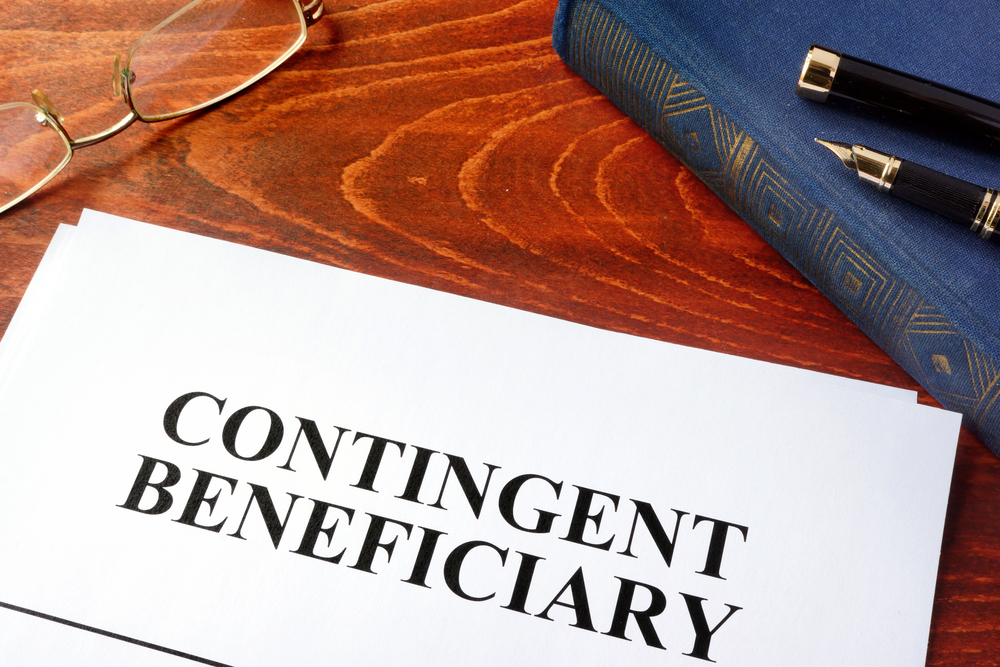


When crafting an estate plan, naming primary beneficiaries is critical in ensuring your assets are distributed according to your wishes. However, what happens if your primary beneficiaries predecease you or cannot inherit for some reason? This is where contingent beneficiaries come into play.
What Are Contingent Beneficiaries? Contingent beneficiaries are individuals or entities designated to receive your assets if your primary beneficiaries cannot inherit or have predeceased you. They provide a backup plan to ensure your assets are distributed as you intended, even in unforeseen circumstances. Contingent beneficiaries allow you to customize your plan to suit your unique circumstances and preferences. You can designate different contingent beneficiaries for different assets or scenarios, giving you greater control over your legacy. If you've been married or in a longstanding relationship, it's almost certain your initial beneficiary will be your spouse or partner. If you have children, it's likely an easy decision to make them contingent or successor beneficiaries to your estate. More often than not, children inherit equally, explains the article "PLANNING AHEAD: The problems we have naming contingent beneficiaries" from The Mercury.
The Importance of Contingent Beneficiaries:
Avoiding Intestate Distribution: Without naming contingent beneficiaries, your assets may be distributed according to your state's intestate laws if your primary beneficiaries cannot inherit (due to death or other reasons). Intestate distribution means that the state determines how your assets are divided, which may not align with your wishes. Contingent beneficiaries ensure that your assets are distributed according to your specific instructions.
Addressing Simultaneous Death: In situations where you and your primary beneficiary pass away simultaneously or within a short time frame, it can be challenging to determine who should inherit your assets without contingent beneficiaries. Naming contingent beneficiaries helps resolve such uncertainties and ensures a smoother transition of your assets.
Providing for Future Contingencies: Life is unpredictable, and circumstances can change. Your primary beneficiaries might experience life events that render them unable to inherit, such as bankruptcy, divorce, or disqualification for other legal reasons. Contingent beneficiaries offer flexibility by allowing you to adapt to changing circumstances and ensure your assets benefit your chosen recipients.
Preserving Your Legacy: Many people have specific intentions for their assets, whether it's providing for loved ones, supporting a charitable cause, or maintaining their family legacy. Contingent beneficiaries help protect your vision for the future and ensure your assets continue to have a positive impact, even if your primary beneficiaries cannot fulfill that role.
Other issues with Contingent Beneficiaries. To avoid conflict, parents often decide to name children equally, even if they'd prefer a more significant share to go to one child over another, usually because of a greater need. This is, of course, a matter of individual preference. However, you may encounter some unexpected stumbling blocks when naming a successor or contingent beneficiaries.
If a beneficiary is disabled, whether a child, grandchild, more distant relative, or even a spouse, you must determine if naming them is a good idea. If the disabled individual receives Medicaid or other government assistance, an inheritance could cause this person to become ineligible for local, state, or federal government benefits. An estate planning attorney with knowledge of special needs planning will help you understand how to help your loved one without risking their benefits.
If the person's only benefit is Social Security Disability—different from Supplemental Security Income or others—they may be free to inherit without a trust and will not impact benefits. Social Security Disability recipients cannot work in "substantial gainful employment."
Choosing a Trustee. Another issue in naming successor and contingent beneficiaries is the choice of a trustee or manager to handle funds if a beneficiary cannot receive benefits directly. A grandparent will sometimes be reluctant to name a son-in-law or a daughter-in-law as trustees for minors if their daughter or son predeceases and the inheritance is intended for a minor or disabled grandchildren. The grandparents may be concerned about how the funds will be used or how well or poorly the person has handled financial matters in the past.
The same concern may be an issue for a child. A trust can be structured with specific parameters for a grandchild regarding the use of funds. If a supplemental needs trust is established, the trustee must understand clearly what they can and cannot do.
What happens if you've run out of beneficiaries? For those with small families or who live into their 90s, many family members and friends have passed before them. These seniors may be more vulnerable to scams or new "friends" whose genuine interest is in their assets. In these cases, we will work with you to craft an estate plan that will meet your wishes by helping you map out the distribution of your estate - be it for a charitable cause or a distant relative.
Conclusion. In the world of estate planning, contingencies are essential. Contingent beneficiaries act as a safety net, ensuring that your assets end up where you want them to be, regardless of unexpected events or changes in circumstances. By carefully selecting and designating contingent beneficiaries, you can protect your legacy, provide for your loved ones, and maintain control over the distribution of your assets, all while enjoying peace of mind, knowing that your estate plan is comprehensive and resilient.
.
Yonkers Office (By Appointment Only)
Garden City Office (By Appointment Only)